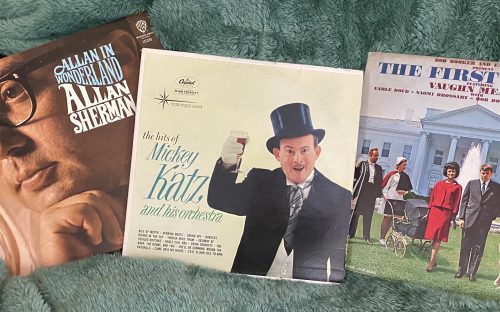By Kieran Loughney
“I’m picking up something for Joel Grey,” said the young man next to me as I shopped at a store in New York City’s West Village. Excited by Grey’s name, I exclaimed, “How cool!” The clerk ringing up my purchase asked, “Do you know him?” I told her, “I sure know his work. I have some of his Dad’s stuff on vinyl, too.” An entertainment legend, actor, singer, dancer and director, Joel Grey, now 88, is best known for originating the master of ceremonies role in the Broadway musical “Cabaret.” He’s won an Oscar, a Tony, a Grammy and a Golden Globe. For me, though, being a cash register and a couple degrees of separation from Grey’s father, Mickey Katz, was a thrill.
Mickey Katz occupies a niche in music little remembered or understood today. For years, Katz’s records appealed to my fascination with the intersection of music and comedy. My affection for the genre went beyond nostalgia. I had heard records from the 1950s and ’60s by artists such as Stan Freberg, whose recordings featured voice actor Daws Butler (Yogi Bear, Snagglepuss, etc.) and Sinatra’s bandleader Billy May and by Alan Sherman (Camp Granada), who also used the richest orchestration to back his silliest tunes. I loved their skewering of everything from commercialism to politics to celebrity. These artists performed social commentary with a melody, standup comedy that rhymed.
My introduction to Katz’s work, nearly as serendipitous as the encounter in the store, began in a dusty basement. A friend was selling the inherited record collection of his Dad, who had recently passed. A serious collector, the Dad stored these vinyl treasures on shelves, dividing them into distinct categories. I found dozens of early rock and roll, big band and jazz records filed there. What sparked my curiosity at the time, however: the section labeled “novelty records.” I climbed out of the basement with Vaughan Meader’s JFK parody album, “The First Family,” Stan Freberg’s comical “History of The United States,” Tex Ritter’s record “Hillbilly Heaven” and two Mickey Katz albums tucked under my arm.
Novelty songs, while a rare blip on the charts today, once enjoyed status as a music industry staple. This type of song takes a popular phenomenon – a social ill (Freberg’s takedown of the commercialization of the holiday in Green Christmas), a musical genre (gunfighter ballads were spoofed with “Big Irving -The 142nd Fastest Gun in the West” by Frank Gallop), or a historic event (Sherman’s “You Went the Wrong Way Old King Louie,” a send-up of the French Revolution) and exploits it for laughs and with luck, a quick buck, too. In 1958, seven of these odd and funny tunes hit the top five on the charts. “Witch Doctor” by David Seville, “The Purple People Eater” by Sheb Wooley, “Yakety Yak” by The Coasters and The Chipmunks’ “Christmas Don’t Be Late” all reached number one in sales. Mickey Katz schmeared some of these hits with his Yiddish humor and Klezmer arrangements, and released his versions, “The Poiple Kishka Eater” and “Knish Doctor,” on the album “The Most Mishege” that same year.
By that time, Mickey Katz had peddled his schtick for nearly a decade. A talented jazz clarinet and sax player, he worked with Spike Jones’ Orchestra. Jones, with his zany arrangements and topical musical spoofs, is remembered as the Frank Zappa of the period. Katz left the group over a pay dispute and formed his own band. He cranked out a series of records, combining comedy and music informed as much by traditional Yiddish culture as by the jazz and popular music of the day. His genius took aim at any pop culture target. Katz released “K’nock Around the Clock,” a kosher take on “Rock Around the Clock,” within about a year of its debut. His parodies of cowboy songs included “Borscht Riders in the Sky,” “Yiddish Mule Train” and “She’ll Be Comin’ Round the Catskills.” High culture received a similar skewering: the opera “Barber of Seville” reimagined as “The Barber of Schlemiel.” Most listeners welcomed his records like a delicious bowl of matzo ball soup, but his songs also offended more than a few folk, and by today’s standards would be dismissed as politically incorrect.
Novelty records, often derided for their inherent goofiness and widely considered low-brow, usually saw limited and brief success. Katz’s records (performed in a hybrid mix of Yiddish and English – Yinglish) occupied a subgenre of the novelty category, making hit record status all but impossible. Mickey never soared in the charts in his own day, and for most he has long since faded into obscurity. But to hear Katz’s priceless spoof of “How Much is that Doggie in the Window” entitled “How Much is that Pickle in the Window” (his work is easily found on YouTube) is to bite into a warm pastrami on rye in “The Marvelous Mrs. Maisel’s” world. Discovering those Katz records and listening to them on my turntable for the first time felt like a weekend at a classic Catskills resort minus the gefilte fish.
Katz’s Jewish heritage informed all his work, his records finding their most enthusiastic fans within that community. Klezmer, an Eastern European traditional dance music, featured prominently in many of his arrangements, usually including solos on his virtuosic clarinet. His comic sensibility, playful creativity (he released a children’s record, “Katz Pajamas,” with comic versions of nursery rhymes), his seemingly helium-enhanced voice and his blending of ethnic and popular music styles set him apart as an original. For Katz to have raised a son of such prodigious talent as Joel Grey had to be destiny or in Yiddish — beshert.
The young man at the adjacent register responded to my mention of Katz and spoke to me. “You’re familiar with Joel’s Dad?” he asked. I nodded, adding, “Yeah, tell Joel he has a fan in the neighborhood and tell him I think his Dad’s records are brilliant.” Joel’s messenger smiled and said, “Joel will be more excited to hear you’re a fan of his Dad.”




Leave a Reply